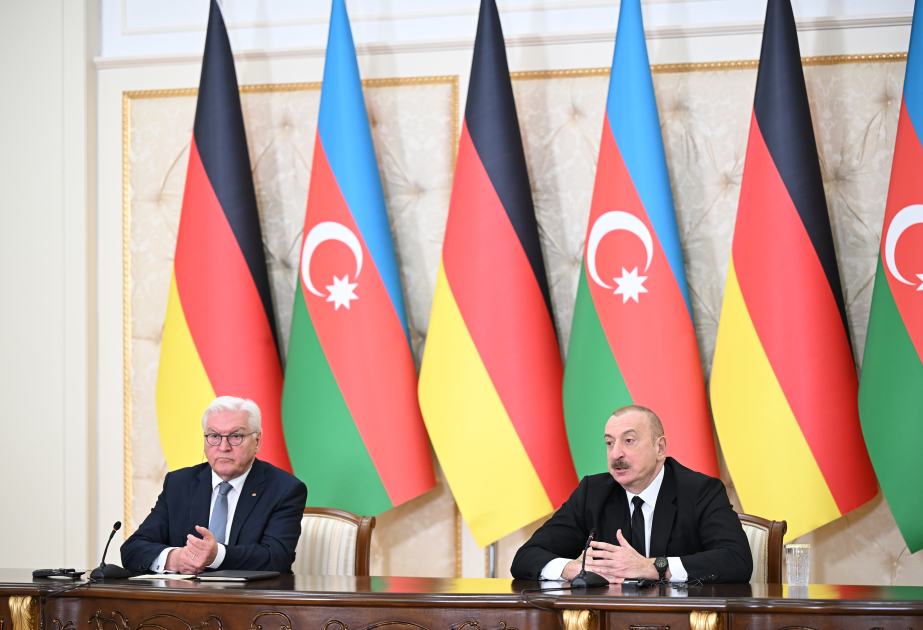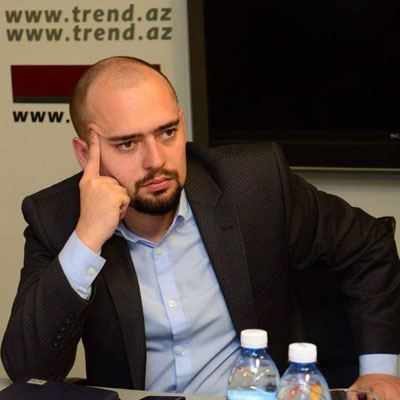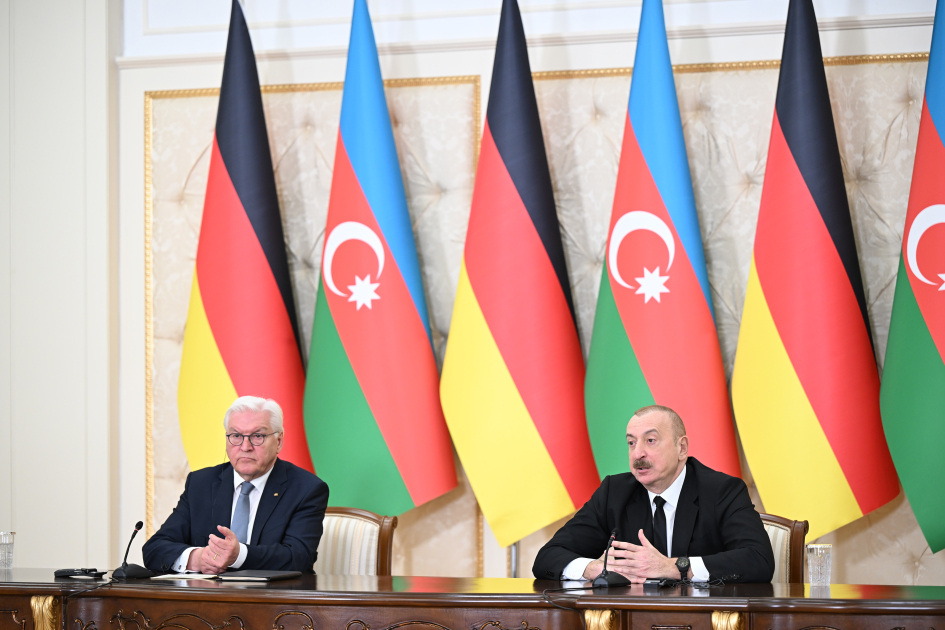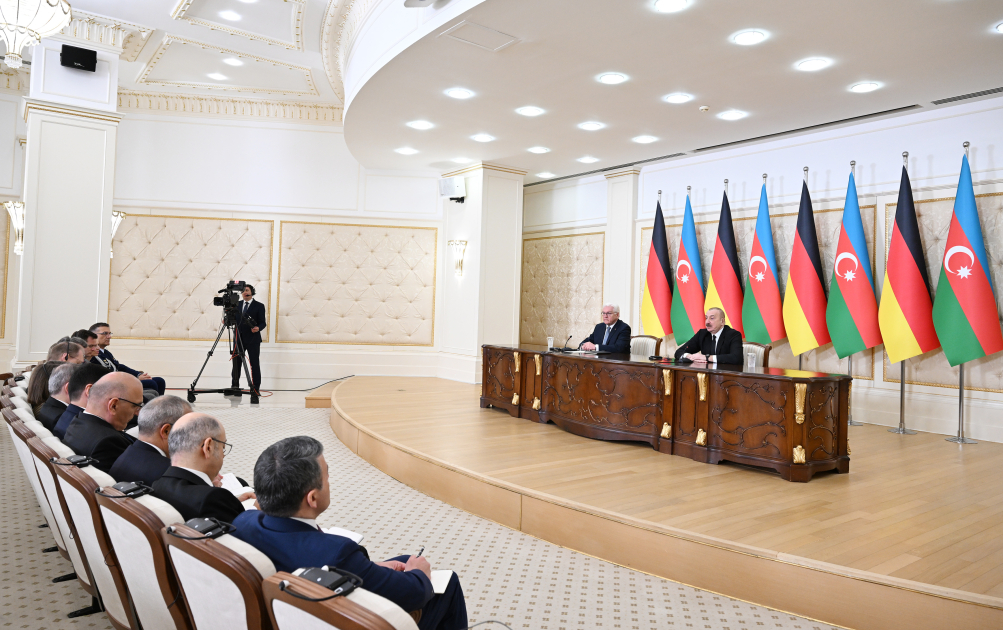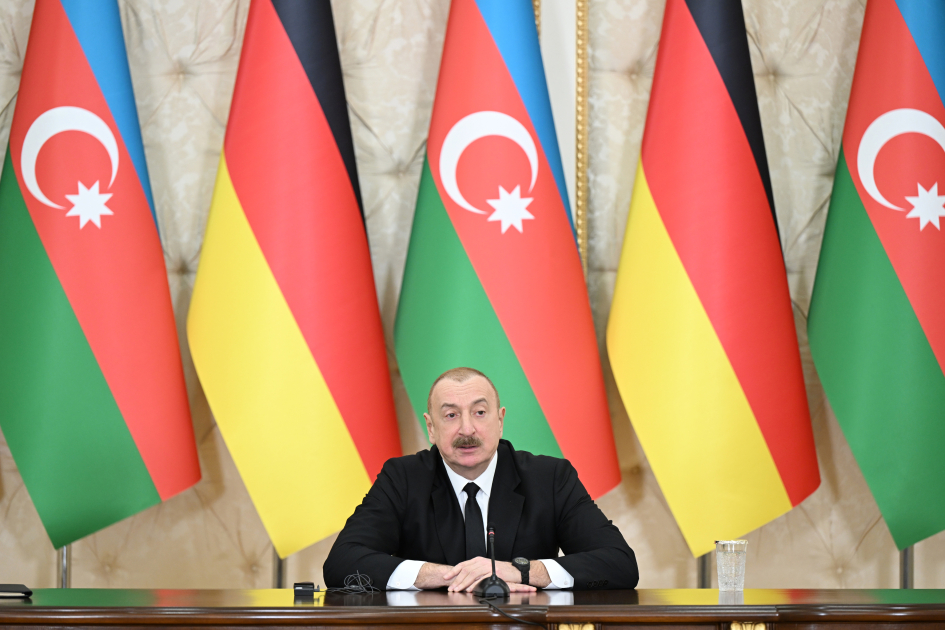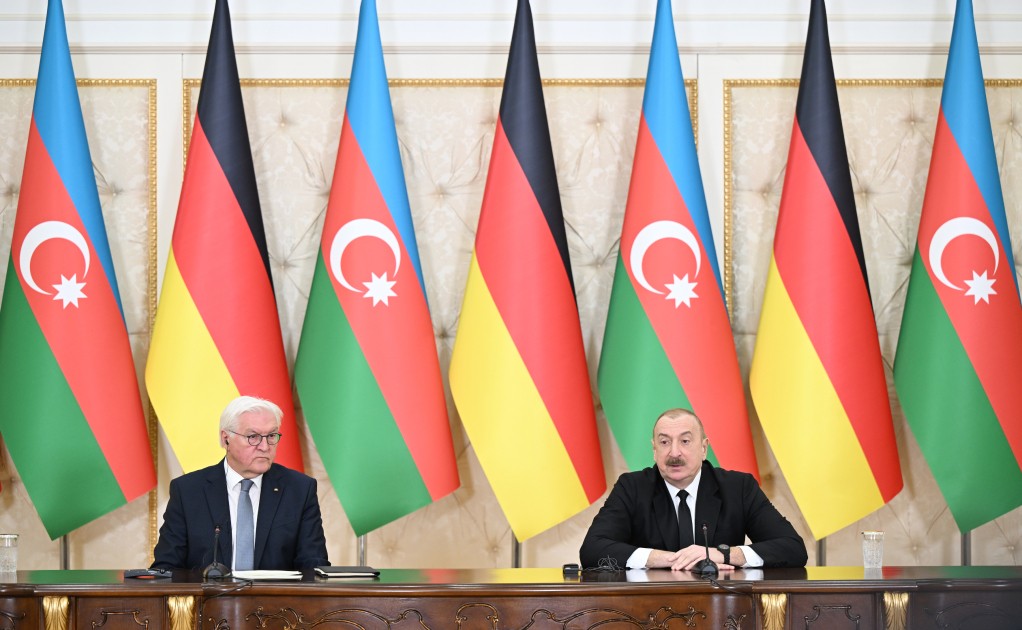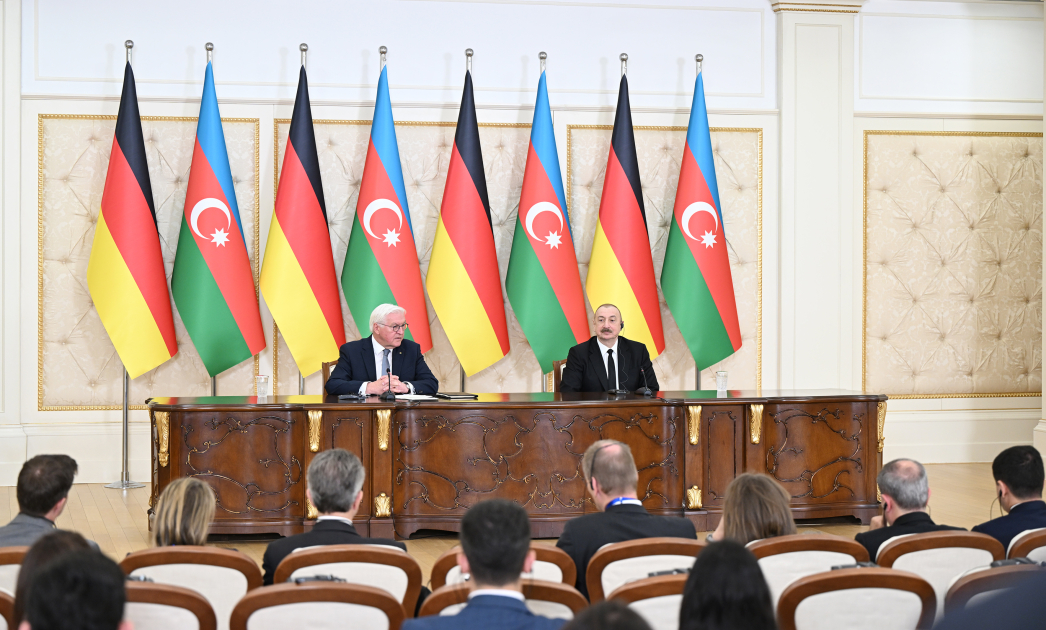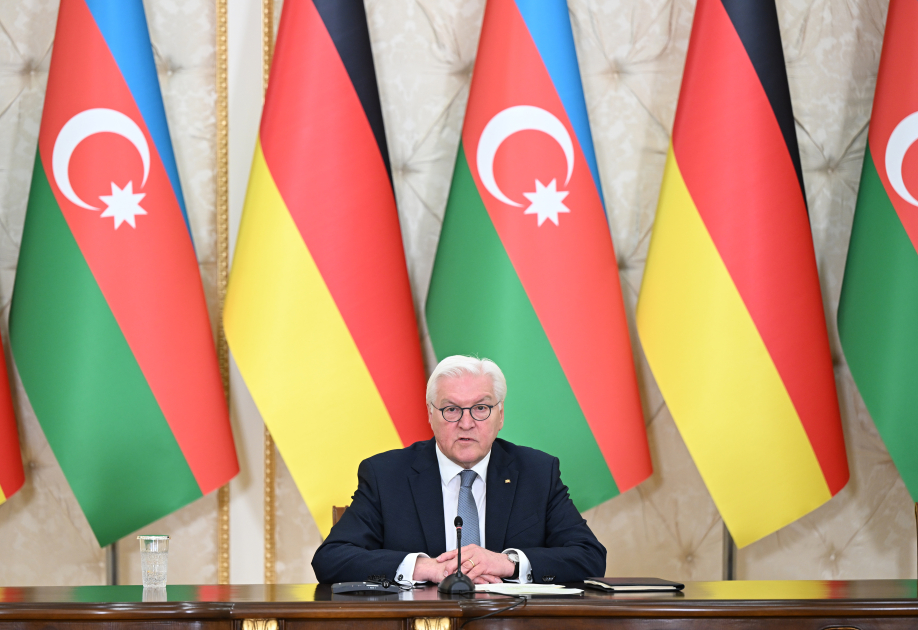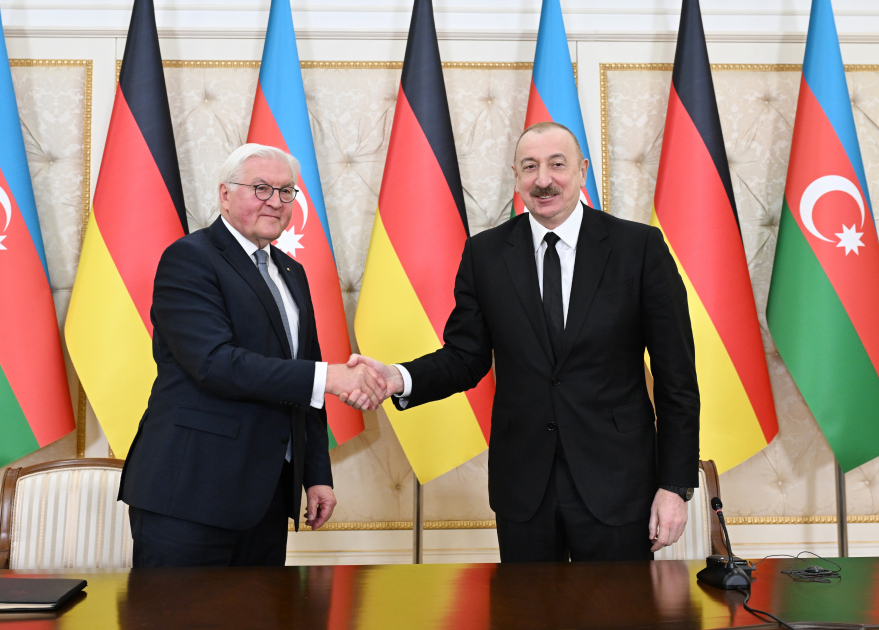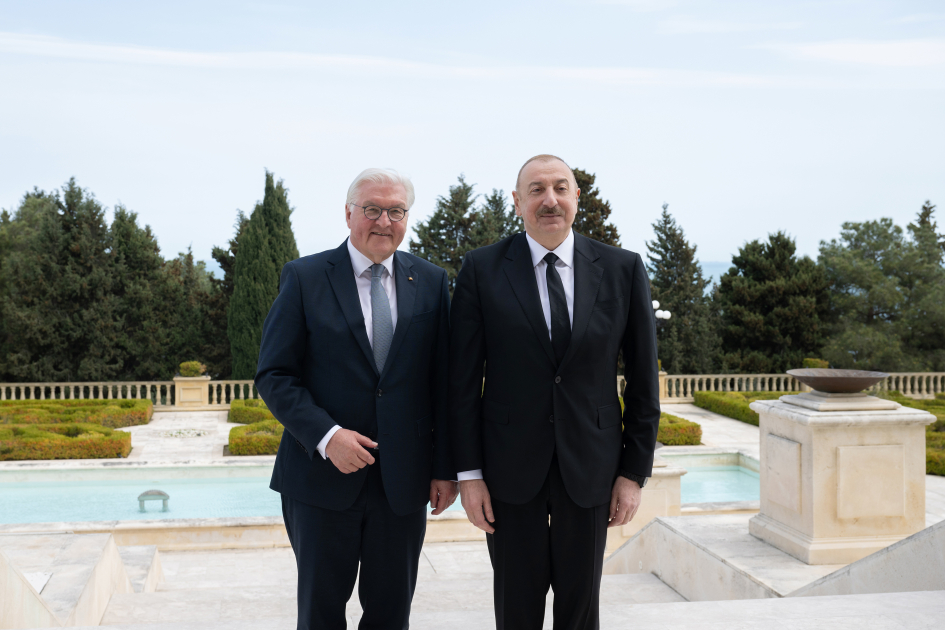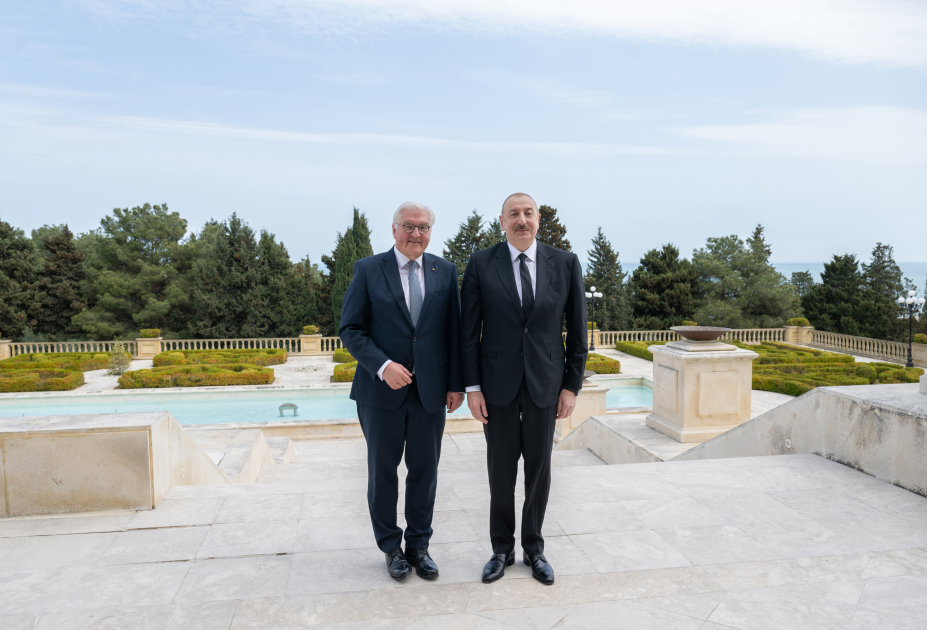BAKU, Azerbaijan, April 2. Ilham Aliyev, President of the Republic of Azerbaijan, and Frank-Walter Steinmeier, President of the Federal Republic of Germany, made press statements and responded to journalists’ questions, Trend reports.
The President of Azerbaijan made the statement first.
Statement by President Ilham Aliyev
- Dear Mr. President,
Dear guests, ladies and gentlemen,
Mr. President, first of all, I would like to once again sincerely welcome you to Azerbaijan. I am pleased that there is a regular political dialogue between us. Last April, we met during my visit to Berlin, and I am delighted that you have accepted my invitation to come to Azerbaijan on an official visit.
Both during our one-on-one conversation and during the talks with delegations, the further development of German-Azerbaijani relations was discussed. I am absolutely convinced that this visit will give a positive impetus to our relations. The results achieved in the economic sphere are certainly reassuring for us. In January and February of this year, our trade turnover increased nearly threefold. The primary reason for this has been the increase in the volume of crude oil exported from Azerbaijan to Germany. Therefore, we believe that we should take more active steps in the coming years to diversify our trade, especially in the field of renewable energy, where German companies have extensive experience and Azerbaijan has a very large program and ambitious plans. We intend to increase the production of renewable energy to 6 gigawatts by 2030 through foreign investments, and this goal is quite realistic. Part of this volume will be exported to Europe.
As you may be aware, Azerbaijan hosted the COP29 international climate conference last year. We also had active cooperation with Germany in this direction. More than 77,000 participants representing 197 countries were registered at COP29. The conference was rich in successful results. The only country that did not participate was Armenia. This, of course, is regrettable, especially under the current circumstances. At a time when a process of normalization between Azerbaijan and Armenia is successfully underway, it was incomprehensible for the Armenian side to boycott this international conference. Today, this issue was also discussed, and Azerbaijan's position was communicated to the German side.
Azerbaijan’s lands were subjected to Armenian occupation for 30 years. Our people were subjected to ethnic cleansing. One million Azerbaijanis were left homeless due to Armenian aggression, and approximately twenty percent of our land was occupied. Unfortunately, international organizations did not take any tangible steps on this issue. Azerbaijan resolved this conflict itself and restored international law on the battlefield and at the political level. It was this historic victory that paved the way for peace negotiations. I believe that today, the positions of Azerbaijan and Armenia have come quite close to each other in achieving peace.
At the same time, other international issues were also discussed today, including the US-EU tensions, the tensions between Russia and the West. All these issues are naturally affecting the whole world, and it was quite important for me to have such a sincere exchange of views.
I want to say again that I am confident that this visit will have positive results. This is the first official visit of the President of Germany to Azerbaijan in the history of our bilateral relations. I am confident that the outcomes of the visit will bring our countries even closer together.
Welcome once again!
X X X
Then, the President of Germany made the statement.
Statement by President Frank-Walter Steinmeier
- My dear colleague, Mr. President, on behalf of the entire German delegation I would like to thank you very much for this sincere invitation and for your hospitality. We are enjoying ourselves very much here. You have mentioned that this is not my first time in Azerbaijan, but it is my first time in the current capacity. This is my first visit as President. I have been to Azerbaijan many times before, but I was last here in 2016, so nine years have passed. The situation in the world is changing so quickly these days. So many geopolitical changes have occurred in nine years that my visit here in 2016 seems like a long time ago. That is why I am glad to be here, to meet again and to be able to have a very broad exchange of views. We have always had such exchanges. Perhaps not in Baku, but we have met in other places and talked on the phone. We also met at the Munich Security Conference, and I also remember your visit to Berlin perfectly well. We had discussions at the meeting last year, and I am glad that I am now visiting your country in return for your visit.
Mr. President, we have talked about the history of relations between our countries. We can recall the first settlement of Swabian peasants here in Azerbaijan and the creation of winemaking traditions. They participated in the development of agriculture. Of course, they also played a significant role in industrialization. German organizations and large companies participated in the development of this industry, in copper mining and in the construction of an electricity grid. Many Germans have lived in Azerbaijan. Therefore, let me remind you that it is important to know the long history of our relations, the fact that the relations between Germany and Azerbaijan have existed for a long time. I am very glad that there is a great interest in Azerbaijan in the German language and in education in Germany. Azerbaijani youth are very interested in studying in Germany, and I do believe that we should expand our relations precisely in the field of scientific cooperation.
I am also very pleased with this exchange. I am glad that we have always been able to speak openly with each other. We have been able to speak openly both about issues where we have common views and about those we have different positions on. In our extensive conversations, both sides have been able to speak openly with each other and have a sincere conversation. We are living in a world where dramatic changes are taking place very quickly. Mr. President has already said what brings our countries closer together. What brings us together is that we are interested in preserving international law and order, in developing the world based on rules, and we do not want to leave a world without rules for future generations.
We have also discussed strategic issues. We have discussed prospects for economic cooperation between us. You have already said this and mentioned several aspects suggesting that Azerbaijan also had a great role for Germany in 2022. When the gas supply we usually received from Russia started to be disrupted, Azerbaijan took on a lot of responsibility, and I am very grateful for that. This is why I understood from your words that, in addition to gas, there is a need to expand the infrastructure here. This is why we need to work on improving the infrastructure. It is not yet sufficient. This is why we have homework after these meetings.
I am very glad that Azerbaijan is developing and becoming a place through which very important trade routes pass. This can lead to the unification of the world. We have talked about our economic and trade relations. Your country is playing a role in our trade relations not only with Central Asia, but also with the Far East, with Southwest Asia, with China. We know that the possibilities of existing roads are currently limited. The role of the roads passing through your country, the Middle Corridor, is also important for the German economy. It is a good prospect and will become an even more interesting prospect in the future. Your region, the South Caucasus, will become a more stable region in contrast to the developments of recent years. Mr. President, I would like to express my opinion on another issue you have touched upon. You spoke about the peace process between Azerbaijan and neighboring Armenia. This peace process is of tremendous importance. As someone observing this from the outside, I can say that it is very impressive. Major steps have been taken and major progress has been made over the past year. I congratulate both sides on this. There is already understanding between you. A statement issued on March 13 said that the text of the peace agreement had been agreed upon. When I spoke about the agreement this morning, I told Mr. President that I hoped that an important moment had been reached with this agreement. Since such an agreement has already been reached, I do hope that this situation will be maintained and you will take advantage of it, leading to the signing of a peace agreement and the establishment of lasting peace in your region. I have great hopes for that and urge you not to miss this opportunity. Despite all the difficulties and obstacles, this road has been covered, many steps have been taken, and it is necessary to move forward to the very end. Therefore, courage and political will are needed for a compromise so that this political agreement can be truly implemented and entered into force. I do hope that this will be achieved, and we will support it as much as we can from the distance. Thank you very much.
X X X
Afterwards, the journalists' questions were answered.
- Ulrich Steinkohl from the DPA Press Agency in Berlin:
- Mr. Aliyev, your counterpart in Yerevan has stated that the obstacles that have arisen with the implementation of this agreement are ones that can be overcome. For his part, he is working on that. The difficulty is that your country is putting forward additional demands. Can you explain how serious you are in saying that you want to sign this peace agreement? My other question is to Mr. Federal President: what is the message you are bringing from Armenia to Azerbaijan?
President Ilham Aliyev: During our conversation today, I provided Mr. President with sufficient information about the Azerbaijani-Armenian peace process. I stated that after the end of the Second Karabakh War, it was Azerbaijan and me personally who initiated the peace negotiations. At that time, neither Armenia nor the OSCE Minsk Group, which was still functioning at the time, put forward any such proposals. This proposal was made by the Azerbaijani side. This in itself shows how interested we are in signing a peace treaty. Since there was no response from Armenia, we outlined the main principles of a possible treaty as well. I remember that five main principles were put forward and discussions started on the basis of those principles. The main obstacle to the negotiations was the fact that up until January 2024, Armenia was insisting on including the fate of the so-called Nagorno-Karabakh republic in the peace treaty. We were categorically opposed to that. Because there is no such republic as “Nagorno-Karabakh”. It existed only in Armenia’s imagination. There is Karabakh region in Azerbaijan. And since this is our internal matter, we could never agree to the inclusion of such a clause in an interstate treaty.
However, a few months after an end had been put to separatism in Karabakh in September 2023, Armenia did agree to remove the article it had been insisting upon on from the text of the peace treaty. Real negotiations essentially started about a year ago. To date, the wording of the peace agreement consisting of 17 paragraphs has been fully agreed upon. Azerbaijan has not put forward any additional conditions here. Our conditions are clear to Armenia and they are not new. We have been putting forward these conditions for a long time. However, we have not received any serious response from the Armenian side to date. What exactly are they? First, the OSCE Minsk Group must be dissolved. The logic behind this is that the OSCE Minsk Group, which was established in 1992, was mandated to resolve the Karabakh conflict. Azerbaijan has resolved the Karabakh conflict itself – on the basis of the UN Charter and within the framework of international law. Since the conflict has been resolved and Armenia officially recognizes Karabakh as Azerbaijani territory, there are no grounds for the de jure operation of the OSCE Minsk Group. This group was not operating de facto anyway. The fact that Armenia does not agree to this raises a legitimate suspicion in us. I wonder why. Does Armenia perhaps want to put forward territorial claims against us again? Their rapid armament, the acquisition of lethal weapons and the fact that France, their main supporter in this, incites them to new provocations increase these doubts, of course. So this is the first issue.
The second issue is related to the constitution of Armenia. The constitution of Armenia contains a reference to the act of independence of Armenia. It is an integral part of the constitution. There is a provision on the unification of the legal and historical territory of Azerbaijan with Armenia, and this is considered an explicit territorial claim against us. Therefore, the removal of this clause from the constitution of Armenia is our legitimate demand. Once these two conditions are met, there will be no obstacle to signing the peace treaty. As they say, the ball is in Armenia's court. If Armenia is genuinely interested in signing the peace treaty, it has to accept these two legitimate conditions of Azerbaijan.
X X X
President Frank-Walter Steinmeier:
- Ladies and gentlemen,
Anyone who has observed this conflict over the past three decades, its escalation and the pain it has caused, the wars that have caused so many victims, will understand that when such a conflict is resolved, it takes a lot of time and effort to restore mutual trust between the two sides. I am saying this in advance and I welcome it. In other words, I know that great effort is required to develop this text after such conflicts. It is a huge task to reach this agreement at the present time. I do hope that agreement can also be reached on the conditions outside this agreement, which Mr. Ilham Aliyev has just mentioned. I believe that they should not become an obstacle to achieving lasting peace between Azerbaijan and Armenia. I repeat that this is a very important spirit, an important moment, and it would be irresponsible to miss the spirit of this moment. It is necessary to remember that the experience of both Germany and Europe is such that the preparation of an agreement, the implementation of a peace agreement is the first step. After that, it takes generations for it to come into force, for it to really become a reconciliation. This is a very long process. It will take a lot of time for both countries and their peoples to really implement this trust and this reconciliation. Therefore, one cannot ignore the fact that this reconciliation takes a long time. But the first step is to prepare, sign, ratify and implement the agreement, so that other issues can be resolved after that. I do hope that this will happen soon.
X X X
Vafa Hamzayeva from REAL Television:
- Good afternoon. My question is for Mr. Steinmeier. Mr. President, you mentioned in your speech that you have been following the developments between Armenia and Azerbaijan, the conflict and the point the two countries have reached now. We are sure that you are aware of the processes. Armenia had been waging a war of aggression on the territories of Azerbaijan for nearly 30 years and flagrantly violated the norms of international law. It occupied 20 percent of Azerbaijan's internationally recognized territories. If sanctions had been applied to Armenia at that time, the conflict would have probably been resolved much sooner. Why do you think the West did not take any tangible steps against Armenia? Thank you.
President Frank-Walter Steinmeier:
- First of all, I want to thank you very much for the question. But you probably heard what I said. I have dealt with conflicts in the South Caucasus in various positions, and I have been familiar with the relations between Azerbaijan and Armenia for a long time. If you look at the policies of German governments in recent years, you will probably see that there has been a very balanced attitude towards this region, both towards Armenia and Azerbaijan. That is, we have tried to show an attitude that does not disregard the sensitivities, and so far we have displayed an attitude in accordance with international law. As I said, we very much welcome the preparation of a peace treaty. We know and recognize that the Karabakh region is Azerbaijani territory. This is our position, and this position can also be specified by Azerbaijan.
X X X
Silvia Stöber, correspondent of the German ARD TV channel:
- Mr. President Aliyev. You mentioned 17 paragraphs. Which of these 17 paragraphs is the most important for Azerbaijan?
Mr. President Steinmeier, you have mentioned the word reconciliation. This reconciliation was important for the restoration of Germany after the Second World War. What role did the rapprochement of those countries in Europe play in this matter? I would be glad if you could talk about that as well.
President Ilham Aliyev: As a matter of fact, each paragraph and each clause of such historic agreements is of great importance. During my conversation with President Steinmeier, I stated that Azerbaijan does not intend to overload this agreement, which is why it is a very concise agreement covering the main principles. Let me repeat that each issue is of serious importance. Experts, lawyers and representatives of the Ministries of Foreign Affairs of the two countries worked hard on this document, and I do believe that both sides demonstrated good will. Otherwise, this document would not have been created. This is the first. Secondly, there are circles in Armenia and in the West that want to blame Azerbaijan for the agreement not being signed. This is completely unfounded. Because, as I have already mentioned, this process was initiated by Azerbaijan. It was Azerbaijan that developed the main principles, and we have been involved in these negotiations in good faith. If we were not interested in signing the agreement, we could have put forward unrealistic conditions so that Armenia would not accept it.
As for the most important of these principles, of course, this is Armenia's recognition of the territorial integrity of Azerbaijan, including Karabakh. Moreover, it comes from the Armenian government, whose head, back in 2019, declared at a rally in Khankendi, on Azerbaijani territory where he had arrived illegally, that “Karabakh is Armenia, period”. I have said several times that some are now trying to portray Armenia as a “peace dove”. But it is the same Armenian government that, after coming to power in 2018, nullified all the negotiations that had been held up to that point. It stated that Azerbaijan should conduct negotiations with the self-styled and illegal “Nagorno-Karabakh republic”. Not only did they fail to withdraw their groundless territorial claims against us, they actually tightened their demands even more. The minister of defense of this very government of Armenia openly stated that Armenia was preparing for a new war for new territories. In other words, it would be completely wrong and groundless to describe the current Armenian government and those leading it as a “peace dove”. The text agreed upon today shows that Armenia is forced to sign this peace treaty because of the Victory we won on the battlefield and because of the subsequent dominance of Azerbaijan’s position on the political level despite the efforts of some European countries standing behind Armenia. Since neither the UN Security Council nor the European Union took any restrictive measures against Azerbaijan, Armenia is forced to recognize Karabakh as Azerbaijani territory today. So, of course, this is the paragraph – a person who used to say that “Karabakh is Armenia, period” is now saying that “Karabakh is Azerbaijan”. I think this is a wonderful evolutionary process, and we welcome it.
X X X
President Frank-Walter Steinmeier:
- Let me say a few words in response to the question asked. How should reconciliation be created? How can one initiate it? There is no recipe for this, there is no standard for this that can be applied everywhere. What we know is that after waging war with each other, trust can only be rebuilt after some time, that is, it does not happen overnight. Mutual trust must be built slowly and carefully. To answer your question, I will give an example from Europe: Ulrich Wickert, a German journalist, a colleague of yours, recently published a book on German-French relations. He writes that over the past 400 years, Germany and France have fought 23 wars. The last three wars – in 1870, 1914, and 1939 – caused a lot of casualties. Germany and France were enemies who hated each other. In old history books, we can see that France was described as Germany's arch foe. In other words, it is not easy to expect friendly relations to be established after so many casualties and that these two peoples would be close to each other. Looking at old history books, this was unthinkable. It took both determination and political will on both sides to leave the past behind and take a step towards a new future. In every region, in the world, including the South Caucasus, there is a desire – probably everyone desires this – to live in freedom and peace. In order to live in peace, the work must also be done politically.
X X X
Orkhan Amashov from Azerbaijan's AnewZ television:
- My question is for President Steinmeier. The trial of the former leaders of the separatist regime created by Armenia in the Karabakh region of Azerbaijan is currently underway in Baku. In their statements, they admit that the bombing of Azerbaijani cities and villages, which resulted in the deaths of more than 100 civilians, was carried out on the direct orders of the current leadership of Armenia, more precisely, Prime Minister Nikol Pashinyan. Regarding those war crimes, why did the European Union and its institutions not impose sanctions against Armenia and its political and military leadership?
President Frank-Walter Steinmeier:
- When I look at Germany's foreign policy, I have been involved in this policy and participated in many governments in recent times. On our behalf, I can say that we never came to terms with the absence of peace in this region. We never supported territorial claims of one side to the other. We proceed from the fact that internationally recognized borders must be valid, recognized and respected. As for Germany's position, I can say that we have remained true to our line, we have always been true to our position. I do hope this is received with understanding in your region. We want the period of non-peace between the two states to be left in the past and a new future to be created, where there is stability. The entire South Caucasus should become a peace-making region for both Armenia and Azerbaijan.

